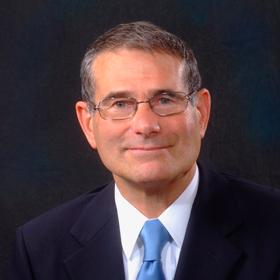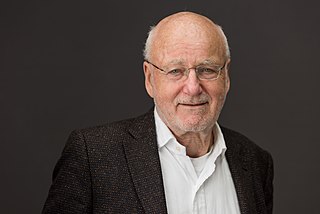Hematology is the branch of medicine concerned with the study of the cause, prognosis, treatment, and prevention of diseases related to blood. It involves treating diseases that affect the production of blood and its components, such as blood cells, hemoglobin, blood proteins, bone marrow, platelets, blood vessels, spleen, and the mechanism of coagulation. Such diseases might include hemophilia, sickle cell anemia, blood clots (thrombus), other bleeding disorders, and blood cancers such as leukemia, multiple myeloma, and lymphoma. The laboratory analysis of blood is frequently performed by a medical technologist or medical laboratory scientist.

The American Society for Microbiology (ASM), originally the Society of American Bacteriologists, is a professional organization for scientists who study viruses, bacteria, fungi, algae, and protozoa as well as other aspects of microbiology. It was founded in 1899. The Society publishes a variety of scientific journals, textbooks, and other educational materials related to microbiology and infectious diseases. ASM organizes annual meetings, as well as workshops and professional development opportunities for its members.
William Dameshek was an American hematologist. He graduated from Harvard College and Harvard Medical School and spent the early part of his career at Beth Israel Hospital. He was the founder of Blood, the prime core clinical journal of hematology, in 1946. He is also credited with describing the concept of myeloproliferative diseases in 1951. In addition, he participated in the first studies of nitrogen mustard in various hematological malignancies, widely considered the first uses of chemotherapy in malignant diseases. Dr Dameshek was also the first one who described chronic lymphocytic leukemia (CLL), a common form of leukemia in adults.
The American Association for Cancer Research (AACR) is the world's oldest and largest professional association related to cancer research. Based in Philadelphia, the AACR focuses on all aspects of cancer research, including basic, clinical, and translational research into the etiology, prevention, diagnosis, and treatment of cancer. Founded in 1907 by 11 physicians and scientists, the organization now has more than 58,000 members in 142 countries and territories. The mission of the AACR is to prevent and cure cancer through research, education, communication, collaboration, science policy and advocacy, and funding for cancer research.
The Society for Hematology and Stem Cells is a learned society which deals with hematology, the study of the blood system and its diseases, including those caused by exposure to nuclear radiation. It was founded in 1950, and held its first official meeting in Milwaukee in 1972. Its mission statement is: "To promote the scientific knowledge and clinical application of basic hematology, immunology, stem cell research, cell and gene therapy and related aspects of research through publications, discussions, scientific meetings and the support of young investigators."
The Society for Immunotherapy of Cancer (SITC), previously known as the International Society for Biological Therapy of Cancer (iSBTc), is a professional society of scientists, academicians, researchers, clinicians, government representatives, and industry leaders from around the world dedicated to improving outcomes in patients with cancer by advancing the science and application of cancer immunotherapy. Currently, SITC has more than 2,400 members, representing 22 medical specialties from 42 countries around the world, who are engaged in the research and treatment of cancer.
The European Academy of Allergy and Clinical Immunology (EAACI) is a non-profit organisation for European clinicians, researchers and allied health professionals in the field of allergy and clinical immunology, covering asthma, rhinitis, eczema and occupational allergy, food and drug allergy, severe anaphylactic reactions, autoimmune disorders, and immunodeficiencies.
The European Association for the Study of the Liver (EASL), founded in 1966, is a medical association dedicated to pursuing excellence in liver research, to the clinical practice of liver disorders, and to providing education to all those interested in hepatology. As of 2024, EASL serves 7,000 members from 112 countries.
The Association for Ocular Pharmacology and Therapeutics (AOPT) is an organization that welcomes members from disciplines related to ocular pharmacology and its therapeutic applications. The mission of AOPT is the sustenance of a scientific network aiming the dissemination of knowledge in the field of ocular disease, pharmacology and therapeutics.
The International Society for Laboratory Hematology (ISLH) is a non-profit organization founded in 1992. Its purpose is to provide a forum for the dissemination of new ideas and information related to the field of laboratory hematology.

Thomas P. Stossel was an American hematologist, inventor, medical researcher, and writer, who discovered gelsolin and invented the BioAegis technology estate. He was also a professor emeritus of medicine at Harvard Medical School and a professor emeritus of clinical research at the American Cancer Society. He was Chief Scientific Advisor to BioAegis Therapeutics Inc., a clinical-stage biotech company developing a non-immunosuppressive anti-inflammatory with the potential to address a wide range of infectious, inflammatory, and degenerative diseases.
Jyoti Bhusan Chatterjea was an Indian hematologist, medical academic and the director of Calcutta School of Tropical Medicine, He was known for his hematological and clinical studies of Hemoglobin E/β-thalassaemia and was an elected fellow of the National Academy of Medical Sciences, and the Indian National Science Academy. The Council of Scientific and Industrial Research, the apex agency of the Government of India for scientific research, awarded him the Shanti Swarup Bhatnagar Prize for Science and Technology, one of the highest Indian science awards for his contributions to Medical Sciences in 1966.
Stuart Arthur Kornfeld is a professor of medicine at Washington University in St. Louis and researcher in glycobiology.

Aleksander Bartłomiej Skotnicki is a Polish hematologist and transplantologist, specialist in internal medicine, professor of medical sciences, Head of the Hematology Clinic of the Jagiellonian University Medical College between 1993 and 2018, academic lecturer, social activist, member of the Polish Academy of Learning.
The International Cytokine & Interferon Society (ICIS) is a non-profit organization composed of researchers of cytokines, interferons and chemokine cell biology, molecular biology, biochemistry, and the use of biological response modifiers clinically. As the premier organization in the field of cytokine biology, it has more than 950 member scientists and holds annual conferences around the world.

Musa Mirmammad oglu Abdullayev was a prominent Azerbaijani hematologist, doctor of medicine, professor, and philologist-translator. He was one of the eight members of the anti-Soviet nationalist student-youth political organization "Lightning" (İldırım), formed for the independence of Azerbaijan within 1942–1944.

Martin Körbling is a German-American internist and hematologist, university professor, medical researcher and pioneer of blood stem cell transplantation.

Bob Löwenberg is a clinical hematologist/investigator. He is a professor of hematology at Erasmus University Rotterdam.

Cynthia Dunbar is an American scientist and hematologist at the National Heart Lung and Blood Institute (NHLBI), which is part of the National Institutes of Health (NIH). She is the Branch Chief of the Translational Stem Cell Biology Branch.

Julie Ann Panepinto is an American pediatric hematologist-oncologist and physician-scientist. She specializes in health outcomes research and sickle cell disease. Panepinto became the acting director of the division of blood diseases and resources at the National Heart, Lung, and Blood Institute in 2022. She was a professor of pediatrics and hematology at the Medical College of Wisconsin.








